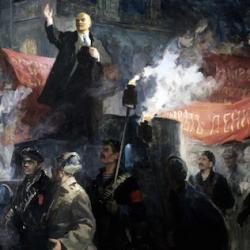Francois Furet’s Lies, Passions & Illusions is a best-seller in France. The little book is Furet’s portion of a conversation-debate with Paul Ricouer. Ricouer put aside his edited version of the conversation when Furet died in 1997, but Furet’s portion was completed and is not published.
Furet’s analysis of twentieth century political life turns in part on his distinction between lies and illusions. Lies are deliberate falsifications. Illusions arise from the “play of passions on the imagination” that gives rise to false beliefs (3). Lies can be countered with facts, though the facts are not always believed. Illusions are harder to eradicate because they aren’t rationally or factually founded in the first place.
To Furet, communism depended on lies, “as testified to . . . by the trips organized for naive tourists and, more generally, by the extreme attention the Soviet regime and the Communist parties paid to propaganda and brain washing” (4).
What made these lies unique was their embedding in a “share illusion” that presented contradictory characteristics: “on the one hand, this belief, completely modern, was no longer transcendent or religious and could be judged only by the course of ‘real’ history; on the other hand, it survived the most spectacular of denials of so-called ‘real’ history and came to an end only with the historical object it served for three-quarters of a century – the Soviet Union itself” (5-6).
Furet has little time for the claim that the communist idea can be detached from its historical enactment in the Soviet Union: For the bulk of the twentieth century, communism was the Soviet Union, and it failed by every measure to do what it promised – to make life better, especially for the workers in whose name the revolution was first pursued.
One aspect of this illusion is the communist claim that it is the bearer of freedom. Furet traces this to the pure negativity of the definition of communism: Communism is anti-Fascist; Fascism is totalitarian; therefore, Communism stands for the opposite, for freedom. Communists tried to anchor their rejection of Fascism in economics, “casting Fascism as the product of financial capitalism’s final phase: henceforth, the only real anti-Fascist was necessarily anticapitalist and therefore Communist.” The claim is “absurd,” but that didn’t prevent it from being a widespread myth of the last century. Furet endorses Orwell’s judgment: “the twentieth century Left was anti-Fascist but not antitotalitarian” (51-2).
And, we might add, not only the twentieth-century Left.














